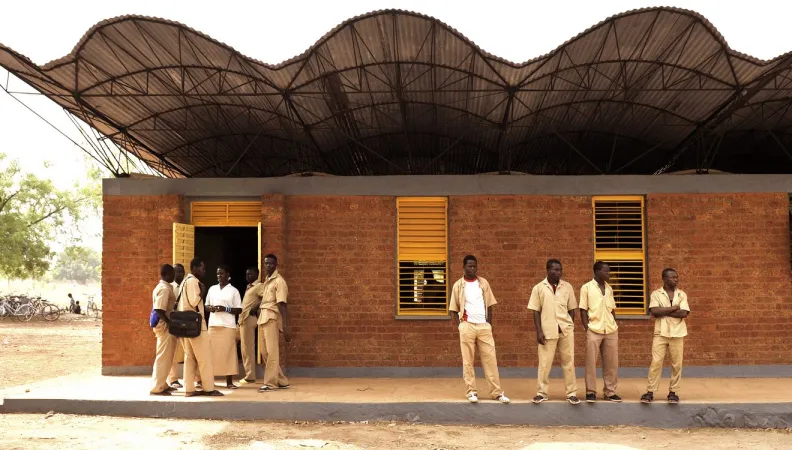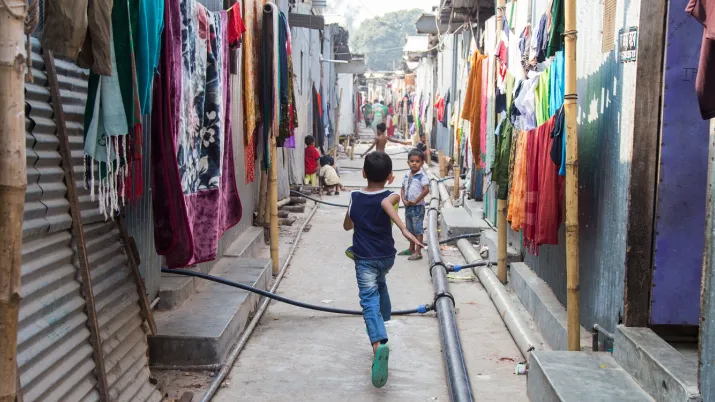Share the page
Solid Partnerships for Making Buildings Sustainable
Published on

Buildings, both in their construction and day-to-day maintenance, require enormous amounts of energy. How to make them more sustainable? This was the objective of the Buildings and Climate Global Forum, held in Paris earlier this month. AFD is supporting this movement through nearly 50 projects around the world as part of the Program for Energy Efficiency in Buildings (PEEB).
The building and construction sector accounts for 21% of the world’s greenhouse gas emissions. And the climate footprint is likely to increase: the buildings sector floor area is expected to double by 2050 in our countries of operation, and air conditioning needs are set to triple. If no real efforts are made to adopt sustainable renovation and construction methods, it will be impossible to achieve the objective of the Paris Agreement of limiting global warming to 1.5 °C.
From a Franco-German partnership to a multilateral commitment
The Program for Energy Efficiency in Buildings (PEEB) has a strong ambition: bring about deep and lasting transformations in the construction and building sectors. It combines financing and technical cooperation to support both national public policies and projects. Its objectives are to drive changes in national regulatory frameworks, share best practice in terms of energy efficiency, and stimulate investment in energy-efficient buildings.
This partnership was launched in 2018 by GIZ, the German development cooperation agency, ADEME and AFD. It initially targeted five countries (Mexico, Morocco, Senegal, Tunisia, Vietnam), before being deployed in other countries and expanding by mobilizing new partners. It is currently supporting 45 projects in 30 countries.
Read the report from Armenia about the Jerm Ojakh project to improve housing energy efficiency
Financial incentives to boost sustainable construction
Energy efficiency and climate change adaptation measures come with a price tag, which can put the brakes on the construction and renovation of buildings. PEEB seeks to remove these technical and financial barriers by mobilizing financial resources to reduce the costs related to the investment.
Assisted by the Green Climate Fund and French Facility for Global Environment, PEEB Cool helps to keep additional costs for sustainable construction and renovation to a minimum in 11 countries in Africa, Latin America and Asia. With support from the European Union, seven countries in the Mediterranean region will benefit from investment grants combined with loans from AFD or Proparco to cover the additional cost of energy efficiency measures.
Concrete achievements on the ground
PEEB offers solutions to adapt the built environment to climate change. It deploys experts to advise, guide and make recommendations to ensure that appropriate construction methods and materials are used. In Tunisia, the technical assistance from PEEB has improved thermal comfort for patients and medical staff at the hospitals in Sidi Bouzid and Gafsa. A guide for building health facilities has also been developed for the Tunisian Ministry of Health.
Further reading: [Special Series] Sustainable Infrastructure to Build a World in Common
In Chad, PEEB’s support for the ProQEB project has helped review the plans for schools and integrate construction methods suited to local climate conditions, especially intense heat waves. PEEB has assisted with the recruitment and capacity building of community-based companies responsible for the construction of schools. The objective is to improve thermal comfort by 27% in these schools for 12,000 students and teachers.
Watch the video: Making Green Housing More Accessible to Turkish Households
Specific contexts, customized solutions
AFD and its partners mobilize appropriate expertise and financing methods based on the specific financial arrangements of the projects and contracting authorities.
In the French overseas territories, AFD and ADEME have introduced a variation of PEEB to help operators improve the energy and environmental performance of their building construction and renovation projects. This customized technical assistance covers a wide range of services, including energy diagnosis and audit, carbon footprint assessment, training and workshops for building professionals, and seismic and hurricane resistance analyses.
From Reunion to Martinique, about 50 requests for assistance from PEEB Overseas France have been approved for various stakeholders, including municipalities and local authorities in St. Pierre and Miquelon and French Guiana, associations in the medical-social sector in French Polynesia, and hospitals in Mayotte and Reunion.
AFD is launching a new initiative in Southeast Asia in 2024: PEEB ASEAN, which is expected to help reduce the energy intensity of ASEAN countries by 32% by 2025 and achieve the “net zero” target. In partnership with the ASEAN Center for Energy, the program will benefit ten countries in the region.
Further reading
World Urban Forum: Housing is a Key Component to the Achievement of the Sustainable Development Goals
Agence Française de Développement will be at the 12th edition of the World Urban Forum in Cairo, Egypt, from 4 to 8 November. This forum is organized by UN-Habitat, the United Nations agency mandated ...
Published on November 4, 2024

